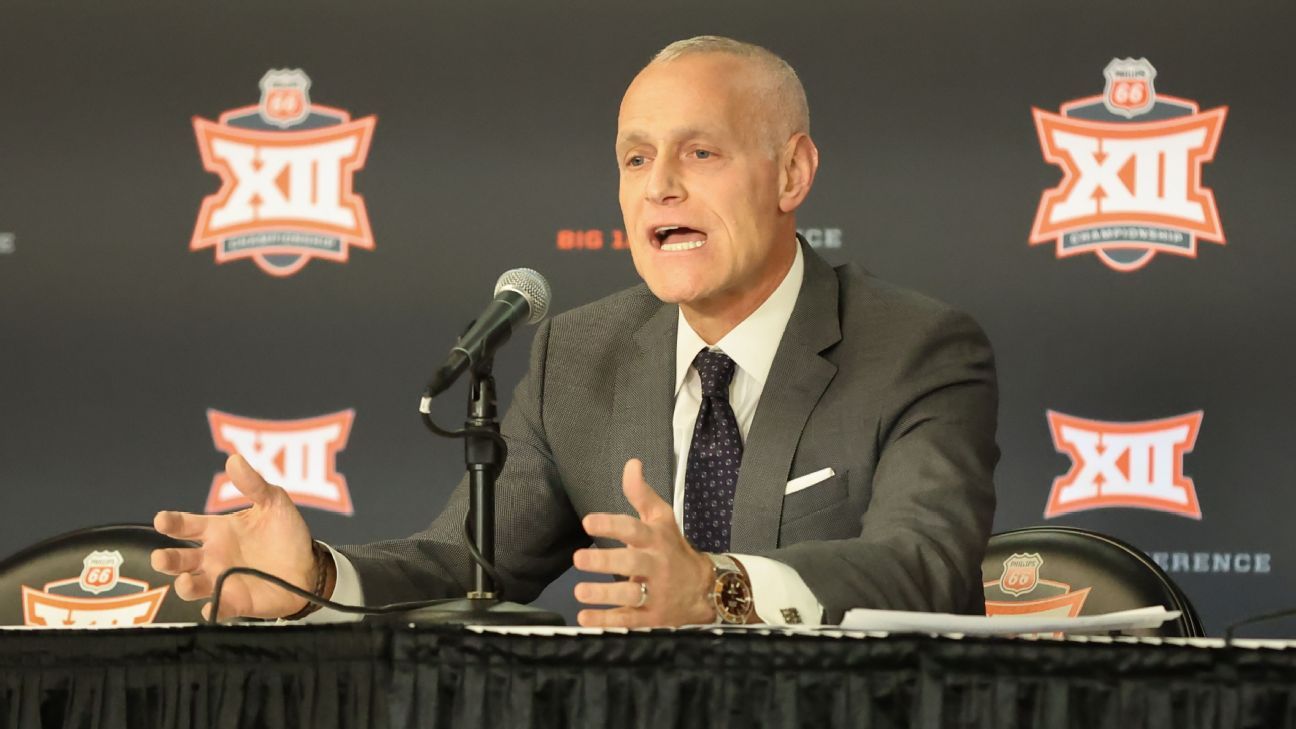Big 12 boss: 2028 ‘look-in’ eases CFP concerns


Heather Dinich, ESPN Senior WriterMay 1, 2024, 05:52 PM ET
SCOTTSDALE, Ariz. — Big 12 commissioner Brett Yormark said he “wasn’t happy” with the league’s recently negotiated revenue distribution plan from the College Football Playoff, but he remains confident in the future of the conference while recognizing the football teams have to perform at a higher level.
In mid-March, all nine FBS conferences and Notre Dame leadership agreed to the next CFP contract, which will begin in 2026 and further separate the Big Ten and the SEC financially from the other leagues. Big Ten and SEC schools will each be making more than $21 million annually. ACC schools will get more than $13 million annually, while Big 12 schools will get more than $12 million annually.
Yormark said he pushed for a “look-in” in 2028, which is halfway through the six-year deal and gives the FBS commissioners an opportunity to reevaluate the economics and “see whether or not anything should be modified or adjusted.”
“Having that look-in made sense for a lot of different reasons,” said Yormark, who spoke to a small group of reporters Wednesday at the annual Fiesta Spring Summitt. “I certainly wasn’t happy with the distribution. I guess you could say in some respects I was satisfied. It was fine. But certainly not happy about it. And I don’t think our ADs or our coaches are either, but we’re going to continue to invest for the right reasons.
“We’re going to continue to build football. It’s at the core of what we do, and I’m excited about the future.”
Yormark said he doesn’t wake up every morning thinking about other conferences, and that the narrative about the growing power and separation of the SEC and Big Ten has been “overstated.” Those two conferences have the bulk of control over the future format, but the other leagues surrendered that in exchange for iron-clad guarantees.
“We spend a lot of time talking strategically about the direction of collegiate athletics and what’s in the best interest of everyone,” Yormark said. “Does the SEC and Big Ten break away from that from time to time and strategize together? I’m sure they do, but I will tell you the chemistry and culture amongst the four commissioners is extremely positive and, even though I’m relatively new in my job, I’d venture to say it’s the best its ever been.”
The CFP will unveil a 12-team format this season and next, but Yormark and the other commissioners on the CFP management committee haven’t determined what the sport’s postseason will look like in 2026 and beyond. There is strong momentum within the room for a 14-team field, and the commissioners did agree that there would be at least 12 teams in the future.
Yormark said more access for student-athletes is “a great thing,” but there is no timeline for deciding the future format and doesn’t expect any decisions “in the foreseeable future.”
“If we end up going to 14 and we can further enhance the championship experience for more teams and more student-athletes, that’s great,” Yormark said, “and I’m going to continue to bet on the Big 12 that we’re going to take some of those at-large spots. In theory, more is more. More is good, but the proof is in the details and I’m excited to see how this year plays out at 12.”
Yormark said he’d like to see the pros and cons of the 12-team format first before trying to modify it.
“It wouldn’t be a bad thing to just play it out this year, but I’m just one of many,” he said. “… We’ll collectively make that decision.”
This week’s spring meetings marked the first time all 16 schools were represented in league meetings following a sweeping conference expansion that added Arizona, Arizona State, Colorado and Utah. Yormark said the league also discussed more access in the NCAA basketball tournament and the coaches “in theory” are for expansion. While he said he hasn’t thought about the number, Yormark said he’s “open to 76.”
“The tournament is one of the greatest spectacles in sports,” Yormark said. “It captivates hard-core fans and casual fans for all the right reasons and you don’t want to mess with something that’s great, but if there’s chances to modify it a bit … We owe it to ourselves to do that.”
Yormark said he understands the conference “didn’t perform probably as well” as others in the past decade of the CFP, but “history doesn’t always repeat itself.”
“There’s a lot to sell here, and I’m pretty good at selling,” Yormark said. “I’m going to continue to push the narrative for all the right reasons while we get better. … Now, we have to perform, don’t get me wrong. It all comes back to performance, and the coaches know that and the ADs know that. But my job is, as we continue to perform at a higher level, to create the narrative behind it.”